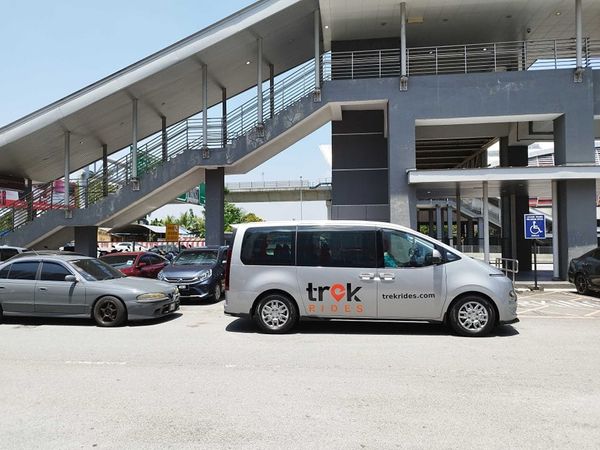By Selangor Journal Team
SHAH ALAM, May 29 — The Selangor government has rubbished any notion that Asia Mobiliti Technologies Sdn Bhd was appointed as one of the two firms to participate in the proof of concept (POC) for the Demand-Responsive Transit (DRT) project in the state via direct negotiation.
State executive councillor for investment, trade, and mobility Ng Sze Han instead clarified that the transport startup, along with Badan Bas Coach Sdn Bhd, was selected to participate in the POC — which began in November last year and has benefitted over 40,000 users — through a request-for-proposal process.
“The decision to involve only these two companies was made because, when the state government decided to initiate the POC process, only they were licensed by the Land Public Transport Agency (Apad) to participate,” he said in a statement today.
[caption id="attachment_316118" align="alignright" width="451"] State executive councillor for public transportation Ng Sze Han (left), accompanied by Badanbas Coach Sdn Bhd chief executive officer Ibrahim Aiman Mohd Nadzmi (right), trying out the Mobi demand-responsive transit (DRT) service at the SS15 LRT station, on June 21, 2023. Picture by NUR ADIBAH AHMAD IZAM/SELANGORKINI[/caption]
State executive councillor for public transportation Ng Sze Han (left), accompanied by Badanbas Coach Sdn Bhd chief executive officer Ibrahim Aiman Mohd Nadzmi (right), trying out the Mobi demand-responsive transit (DRT) service at the SS15 LRT station, on June 21, 2023. Picture by NUR ADIBAH AHMAD IZAM/SELANGORKINI[/caption]
“Apad’s role is to set conditions and guidelines so that the companies participating in the POC can meet the established standards. These include having their own fleet of mini buses or vans, vehicles not exceeding 10 years of age, drivers with a valid Class D licence, and being free from blacklists.
“All these conditions must be met before Apad issues a licence to any company,” Ng said.
This is based on the information that the special committee established by the state government to oversee the DRT pilot project’s implementation decided to involve both companies equally in the POC process.
“This ensures that no single company monopolises the testing process and allows the people of Selangor to evaluate the effectiveness, comfort, and efficiency of the services provided,” he said.
Earlier this month, the state government also received a proposal from another company — Kumpool Sdn Bhd — to participate in the POC process after receiving Apad approval. The company is being considered for the next phase of the DRT project.
Ng said the state administration is prepared to present the entire request-for-proposal evaluation process to the authorities in the spirit of transparency and accountability.
“The state government is confident that the evaluation process and the decision to involve these companies were carried out prudently and on a solid foundation, meeting existing legal conditions and guidelines,” he said.
Asia Mobiliti has been the centre of attention after several quarters raised questions over a perceived conflict of interest in its appointment to operate the state’s DRT service.
This is because the firm’s founder and chief executive officer, M. Ramachandran, is the spouse of Youth and Sports Minister Hannah Yeoh.
However, Ng stressed that the evaluation conducted by the state’s special committee was based on the company’s capabilities, which had passed Apad’s initial screening.
Meanwhile, the councillor said that since the POC period began, 40,674 people in Selangor have benefited from the bus-on-demand service across eight routes.
Four of the routes are operated by Asia Mobiliti, namely in Ampang, Hulu Kelang, Puchong, and UPM-Serdang, while Badan Bas operates the other four in Subang Jaya, Petaling Jaya Utara, Petaling Jaya Selatan, and Sungai Buloh.
Both companies' POC periods end in July, while the licence issued by Apad expires on August 31 and is not automatically renewed.
He said Selangor has also allocated RM2.1 million in funds equally to both companies to provide subsidies for passengers utilising the DRT service throughout the POC period.
“Payments are not dispersed in a lump sum, but rather in stages through three phases, to ensure no misuse of state funds.
“The estimated cost per user per trip is RM5, but to encourage more residents to use public transportation, the state government will cover RM3 of the cost for each passenger, so they only need to pay RM2 each time they use the service,” Ng said.




